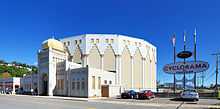Cyclorama of Jerusalem

The Cyclorama of Jerusalem is located in Sainte-Anne-de-Beaupré, Quebec, Canada, near the Basilica of Sainte-Anne-de-Beaupré. It is a cyclorama, a circular painting, of the Crucifixion of Jesus, showing what the city of Jerusalem might have looked like at the time of his death. The cyclorama has been on display since 1895. It was painted by Paul Philippoteaux, the famous panoramist from Paris, assisted by five other painters: Salvador Mège (1854–1915) and Ernest Gros, of Paris, Charles Abel Corwin[1] and O.D. Grover, of Chicago and Edward James Austen (1850–1930), of London. [2]
The Cyclorama is, as claimed by the official website, one of the world's biggest.[3] It measures 14 by 110 metres (46 ft × 361 ft). Among the scenes are: The South section of Jerusalem... the Tomb of Absalom... King Herod's beautiful white palace... the splendid residence of his wife Marianne... the castle of his brother Phasaleos. . . the palace of Hippicus. . . the country side and road leading to Bethlehem, birthplace of Jesus. People, Camels, Horses. . . the group of women. . . the Tomb of Jeroboam. . . and the Shepherds.
In 1958-59, owner George Blouin hired Professor Stefanoff to restore the "Cyclorama of Jerusalem". Stefanoff painted 45 feet (14 m) high by 125 feet (38 m) long. He also created the striking foreground 23 by 360 feet (7.0 by 109.7 m). George H. Blouin wrote regarding the restoration: "In brief, it is a magnificent work of art. In consideration of the marvellous work, all the destroyed areas are executed exactly as they were before the destruction, and even better because of Stefanoff's touch. I hereby declare that Professor Christo Stefanoff is the most celebrated panoramic painter in the world today, with an international fame."
References
External links
| Wikimedia Commons has media related to Cyclorama of Jerusalem. |